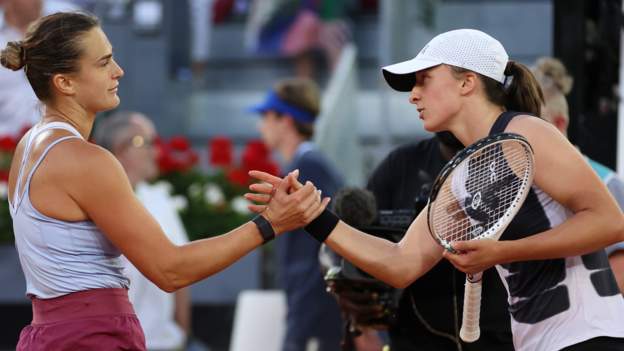| Venue: Roland Garros, Paris Dates: 28 May-11 June |
| Coverage: Live text and radio commentaries of selected matches across BBC Radio 5 Sports Extra, the BBC Sport website and app |
Sue Barker says women’s tennis needs more big rivalries to grow interest in the sport after further scheduling controversy at the French Open.
Tournament organisers have been criticised with only one of the 10 Roland Garros night sessions featuring a match from the women’s draw.
American player Jessica Pegula has called the situation “disappointing”.
Former French Open winner Barker, 67, said it was a “tricky situation” for tournament director Amelie Mauresmo.
The night-session match is promoted as the highlight of the day, with only Aryna Sabalenka’s fourth-round contest last Sunday against Sloane Stephens scheduled at night in this year’s tournament.
Only one of the 10 night matches last year involved female players.
Former world number one Mauresmo argued the men’s matches had more “appeal” and it was hard to find enough stars or compelling match-ups in the women’s draw.
World number one Iga Swiatek found those comments “a little bit disappointing and surprising” and Mauresmo later apologised.
Saturday’s final sees Poland’s Swiatek defend her title against Czech outsider Karolina Muchova, ranked 43rd in the world.
“It’s a slight dilemma for a tournament director with the men’s game being best of five sets and the women’s being best of three,” former BBC presenter Barker told BBC Radio 4 Woman’s Hour.
“If you do schedule a match for the night session and it only lasts an hour, because some of the women’s matches only last an hour, then the public isn’t going to like it.
“It’s a very difficult, tricky situation for Amelie [Mauresmo] to be in. And sadly, now with Serena [Williams] having gone, there aren’t the big names in the women’s game at the moment. They’ve got to build up.
“What we really need is a few really good players to be in the slam finals for a few years and build up that rivalry that we’ve seen with Roger [Federer] and Rafael [Nadal] and Novak [Djokovic] and Andy [Murray].
“People don’t really know who those players are. Elena Rybakina, who won last year at Wimbledon, I don’t think you would know her if she walked down the street.
“We need to have more established players in the same fame as Maria Sharapova and Serena and Venus Williams.”
Unlike the Australian Open and US Open, which schedule two night-session matches every day, the French Open has just one.
In March, Women’s Tennis Association (WTA) chief executive Steve Simon told BBC Sport having women’s matches at night sessions at all tournaments is “very, very critical” in the fight for equal prize money all year round.
“I’m thrilled that now Wimbledon on centre court has three matches and they have two men’s, one women’s and then on another day they have two women’s, one men’s,” added Barker, whose French Open title in 1976 was her only Grand Slam success.
“I sort of have sympathy for Amelie, I understand it. But at the end of the day we want equality across all the tournaments. That’s what we’ve been fighting for and that’s what we really need.
“But also the players have to provide it.”

